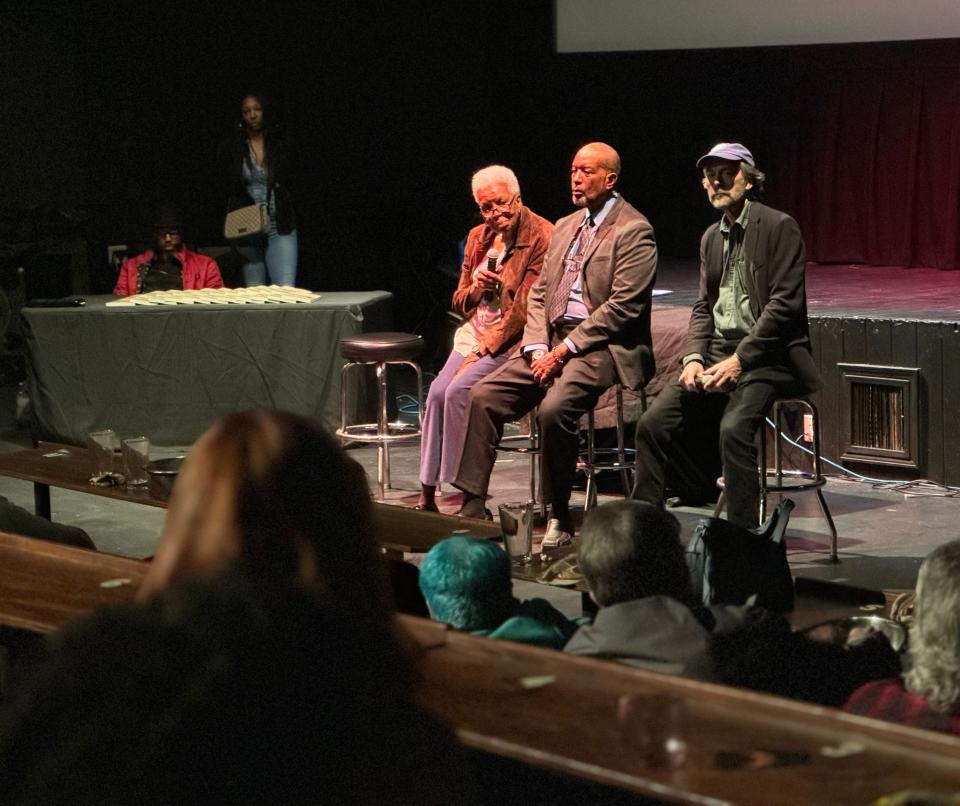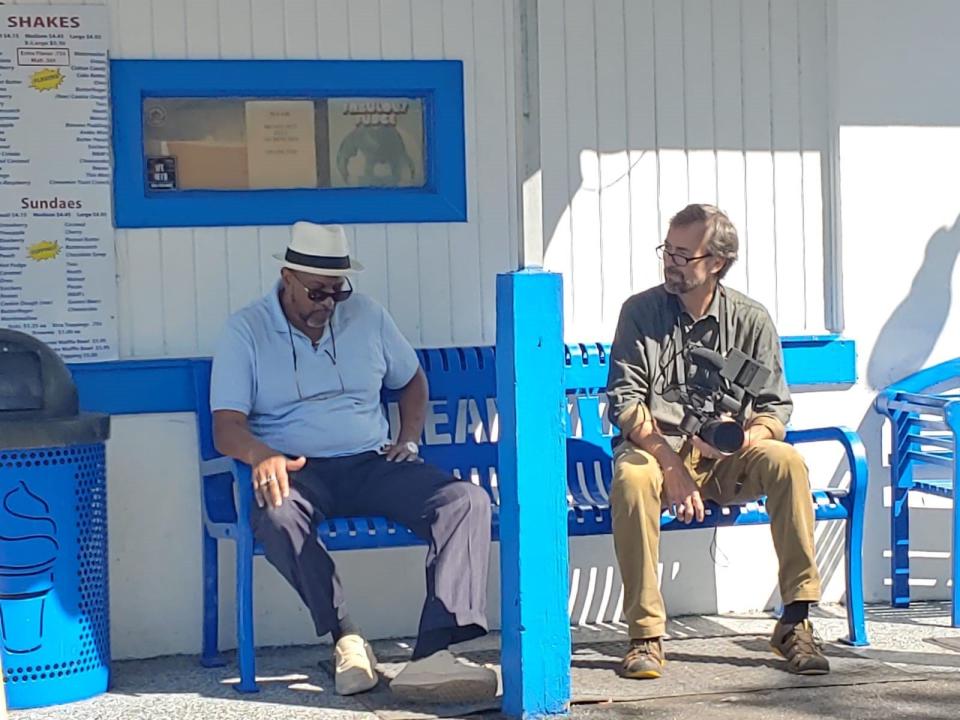It wasn't just another bombing. They survived and, 60 years later, returned to Jacksonville.
Donal Godfrey and Hal Jacobs are the same age, 66. They both grew up in Murray Hill. Their childhood homes were just four streets apart — or they were until the early morning hours of Feb. 16, 1964.
That’s when an explosion ripped through Godfrey’s home.
Klansmen put 20 sticks of dynamite under the house and triggered a blast that left a gaping hole in the living room floor but somehow didn’t kill Donal Godfrey, his mother or three other family members living there.
The reason for the bombing: 6-year-old Donal was the first Black student at the neighborhood school, Lackawanna Elementary.

Hal Jacobs didn’t hear about the bombing the next day. He didn’t hear about it until decades later.
While he did learn about some of the well-known pieces of Civil Rights history — like the 1963 bombing of a Birmingham church that killed four little girls — it wasn’t until a few years ago that he first heard about what happened five months after Birmingham, four streets from his boyhood home in Jacksonville.
He read something Tim Gilmore, a prolific chronicler of local history, had written about the KKK in Northeast Florida. Gilmore had found Donal Godfrey, who was living overseas, and talked to him about what happened in 1964.
For Jacobs, now a filmmaker living in Decatur, Georgia, this led to a documentary that he says started with a simple question: “Why didn’t I know this story?”
He titled his film, “Just Another Bombing? This is Donal and Iona’s Story.”
In the week after the 60th anniversary of the bombing, the 25-minute film was shown three times in Jacksonville: at the University of North Florida on Tuesday afternoon, at the Sun-Ray Cinema on Wednesday evening and at the Murray Hill library branch on Thursday evening.
What made these screenings particularly notable was who was in the audiences: Donal Godfrey and his mother, Iona Godfrey King.
He lives in Ghana. She lives in Washington D.C. They have been hesitant to come back to Jacksonville, preferring to leave that part of their past in the past. But they returned in 2022 to be interviewed by Jacobs. They went back to where their home used to be (there’s a different home there now). They stood in front of Lackawanna Elementary (closed and surrounded by chain-link fence). They sat and talked about what happened the night of the bombing.
When they returned to Jacksonville this time, it was to see their story shown on screens — the first time they’d seen the completed documentary — and talk about it afterward.
“It makes me kind of teary, because I hadn’t recognized the person I was then,” Iona King said after the UNF screening, describing her 20-something else. “She was just determined.”
She explained that when she enrolled her son at Lackawanna she wasn’t thinking about making history. She was simply a young mother trying to make a better life for her child.
At age 84, she thinks about how they came close to losing all of their lives, how the children and grandchildren who have come since wouldn’t be here.
She also thinks about how it “wasn’t special.” And when she says this, she means that while it was such a significant moment for her family, it was hardly unique. There were other bombings, done for similar reasons, using similar methods.
Not that it was just another bombing.
As her son pointed out after the screenings, there’s something that differentiates it, and them, from others: They survived.
'So we went'
They moved from Lavilla when Donal was little. His mother and her sisters decided to buy a house in Murray Hill, at 3259 Gilmore Street, where a few blocks of Black residences were tucked in the middle of a white neighborhood.
By the summer of 1963, it had been nearly a decade since the Supreme Court had ruled on Brown v. Board of Education. Schools were supposed to be desegregated. Even though that still wasn’t the case across Duval County, Donal’s mother enrolled him at the nearby, all-white school.
This leads to one of several scenes in the movie that, amidst the seriousness of the topic, got laughs during the screenings. Donal is standing next to his mother, listening to her recall the decision to enroll him at Lackawanna. She says it had nothing to do with an NAACP plan to enroll some Black students in all-white schools.
“I was not part of that plan,” she says. “I knew nothing about it. All I knew was there’s a school close to where we live. The government says we can go. So we went.”
“We?” he says. “I went.”
Bombing didn't stop integration
On the first day of school, on the walk to school, angry white mothers screamed the n-word at him and his mother. This became part of Donal’s routine. There were phone calls to the house with threats. But until Feb. 16, 1964, they were just threats.
Iona recalls that she had stayed up late baking a cake. She put it away and went to bed. It was close to 2 a.m.
The explosion blew Donal out of his bed. Iona remembers everyone calling out, checking to see if they were OK.
They figure they were lucky. The blast was on the side of the house opposite where they were sleeping.
The bombing was front-page news in Black newspapers and made some national news, including a brief mention by Walter Cronkite on the CBS Evening News. It wasn’t on the front page of Jacksonville’s daily newspapers. A headline inside the Times-Union said: “Blast Rips House on Gilmore St.” The subhead said: “No One Injured; Negro Owner’s Son Attends Integrated School.”
Two weeks later, a member of a local Klan chapter, William Rosecrans was arrested. He gave authorities the names of five other Klansmen. Rosencrans pleaded guilty — he testified in court that he’d placed the bomb "to get the n----- out of Lackawanna” — but the others ultimately were acquitted by all-white juries. Their attorney, J.B. Stoner, declared the verdict a “victory for the white race.” (A few years later, Stoner would become a defense attorney for James Earl Ray, the killer of Martin Luther King Jr.)
In the film, Jacobs asks Donal and Iona if anyone from the school or city reached out to them after the bombing. No, they say, laughing at the idea. People at the school didn’t want a Black boy there. And city leaders didn’t want schools integrated.
While the bombing left them homeless, scattered to the homes of friends who took them in, it did not succeed in achieving its larger goal, articulated openly and loudly the previous year by Alabama Gov. George Wallace: “Segregation now, segregation tomorrow, segregation forever.”
Donal did initially go to another school, but a few years later he returned to a more integrated Lackawanna. He went on to graduate from what was then known as Robert E. Lee High — now Riverside High — and earned a bachelor’s degree from Regents College and a master’s from the University of Maryland while serving 21 years in the military.
He now lives in Ghana with his wife, Winnifred, and three children. He wrote a memoir, “Leaving Freedom to Find Peace: My Life’s Story.”
At the end of the documentary, and during the discussions, he talked about that story.
He didn’t die in a bombing at age 6. But at age 66, when he’s in America, he still worries about dying a violent death. When he’s in a movie theater or restaurant, he has the nagging fear that someone might walk in and start shooting. And when he looks at the news of the day, he’s glad to be living elsewhere.
“I don't feel at peace here,” he says in the final scene of the film. “It's just too much stuff going on with the politics, the shooting in the streets, the infestation of Proud Boys and those groups … The Klan is dead, but these are these offshoots.”
Journey from 1964 to 2024
Sixty years after the bombing, a city leader did reach out to Donal Godfrey and Iona King. City Council President Ron Salem grew up in Murray Hill, the child of immigrants, but also didn’t know until recently about what had happened in his old neighborhood in 1964.
He invited them to come to City Hall on Friday, the day after the final screening.
Earlier in the week, Mrs. King said they weren’t sure what to expect from this return to Jacksonville. When they went to the first screening, at UNF, they were greeted by a diverse audience, many of them students who weren’t alive in 1964. She thanked them for coming and emphasized a point that she repeated after other screenings.
“If you don’t use your voice, you will lose your voice,” she said, adding that while there are many reasons to be disillusioned with today’s politics it is critical to vote, particularly in local elections. “You have to vote.”
The next night at the Sun-Ray Cinema, the theater was nearly full. And when the screening ended and Donal and Iona made their way down the stairs to a couple of chairs up front, the crowd gave them a standing ovation.

When Mrs. King was asked about her journey, she said at age 22 or 23, you’re not thinking about a journey. You’re thinking about tomorrow. She was a domestic worker who, she says, was fortunate to be surrounded by teachers who believed she could do more. And she did. While working full-time, she attended Edward Waters College at night. It took her a decade to get her degree. She went on to work for the Head Start program and teach, at Florida State College of Jacksonville and in Maryland.
For the final screening, they went back to Murray Hill. For the film’s director, going to the library was a return to a place where he spent time as a kid.
For a long time, Jacobs thought of his childhood as an idyllic time in an idyllic place. He and his buddies hopped on their bikes and rode to the Dreamette. They played baseball in the park, went to movies at the Murray Hill Theatre, checked out books from this library.
Why didn’t he know the story of a bombing in his neighborhood?
Some of it was the news coverage, or lack of it. Some of it was just another sign of the times, how they grew up oblivious to what it was like for others to grow up in the same neighborhood. Many of the places he went remained segregated. Some were in areas known as KKK territory.
Jacobs put a note at the start of the film, a message about modern-day Florida, telling educators that recent laws might prevent them from showing "Just Another Bombing?" to students.
“I see this short film as a conversation starter,” he said after the Sun-Ray screening. “It's meant for you to identify with these people on a very personal level. They're not civil rights giants but I think what Iona did is almost on the level of what Rosa Parks did.”
He says Rosa Parks basically said, “I'm tired. I'm not going to the back of the bus. I'm going to sit here.” And he says Iona Godfrey King made her own simple statement: “I'm working. And I'm going to send my child to the nearest elementary school.”
mwoods@jacksonville.com, (904) 359-4212
This article originally appeared on Florida Times-Union: 'Just Another Bombing?' tells story of Donal Godfrey, Iona King

